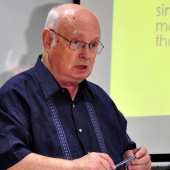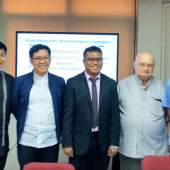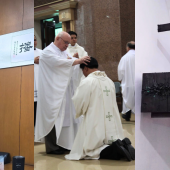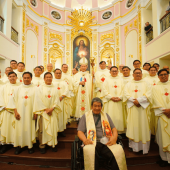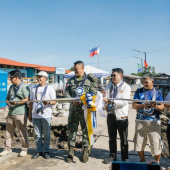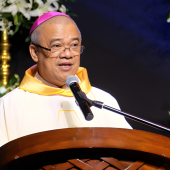Philippines: Mangyan Missionary Fr. Dinter, SVD Laid to Rest, Tributes Continue
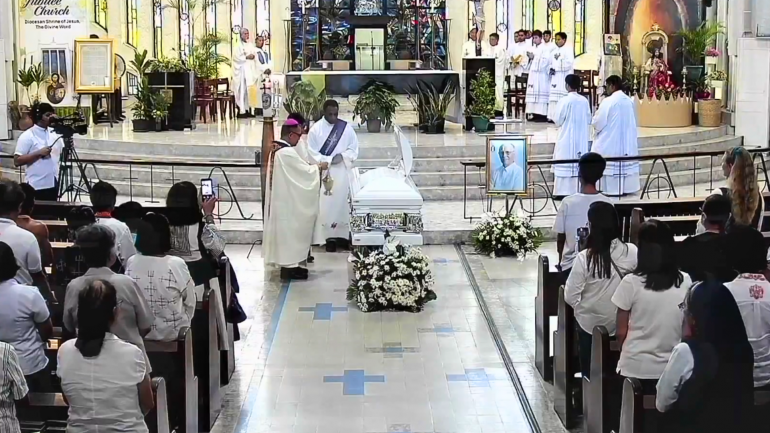
Mangyan missionary Fr. Ewald Dinter, SVD, 88, was laid to rest at Arnoldus Eternal Garden, in Quezon city, the common cemetery of the SVDs and SSpS sisters, on Friday, November 21. The funeral followed a 3 p.m. Mass at the Diocesan Shrine of Jesus the Divine Word, Christ the King Mission Seminary, presided over by Bishop Moises Cuevas of the Apostolic Vicariate of Calapan.
The event drew fellow missionaries, friends, relatives, and members of the Mangyan indigenous communities, who fondly called him “Amang” (Father). Fr. Dinter passed away on November 14 at the University of Santo Tomas Hospital in Manila. He served as a Mangyan missionary from 1967 to 2025.
At the funeral, Fr. Dinter was described as “a light that continues to shine, not just for himself, but for others… His light will continue to inspire generations to come.” Fr. Gabayno Oybad, a Mangyan Hanunuo priest, shared how he experienced Fr. Dinter’s saintly life, noting his contributions in evangelization, promoting indigenous peoples’ rights and dignity, education, culture, livelihood, and health. Fr. Dinter personally entrusted Fr. Oybad to succeed him as director of the Mangyan Mission.
Tributes Highlight Lifelong Mission
Fr. Vicente Castro, SVD, highlighted how Fr. Dinter’s work, alongside other missionaries, left a lasting impact not only in the Philippines but globally. He assured the Mangyan communities that God and the Church would continue to support them.
During the Mass, the Christ the King Mission Seminary livestreamed Fr. Dinter’s reflections on evangelization as a continuous process of inculturation, describing it as a dialogue with the Mangyan people that honors their values, songs, poetry, feasts, and governance.
Fr. Dinter’s remains were brought from Quezon City on November 18 to the Mangyan Education Center in Bait, Panaytayan, Mansalay, Oriental Mindoro, for an overnight wake. There, the community observed the Misa Bibiliya and Pandinawan, indigenous prayers promoted by Fr. Dinter, led by local lay leaders. His remains were then transferred to Sto. Niño Cathedral, Calapan City, where a Requiem Mass was presided over by Bishop Moises M. Cuevas on November 20, before returning to Christ the King Mission Seminary for the final farewell.
Legacy of Service and Cultural Preservation
The Mangyan Mission described Fr. Dinter as a faithful missionary whose kindness, courage, and respect for indigenous culture leave a legacy to inspire generations.
The Mangyan Heritage Center Board of Trustees remembered him as more than a co-founder: “A fellow director, mentor, dear friend, and steady, quiet compass who shaped our mission. His passing leaves a quiet but immense space in our hearts. He guided us with wisdom, kindness, and sacrifice.”
Fr. Dinter’s mission also emphasized preserving Mangyan cultural heritage, especially the pre-Hispanic Mangyan bamboo script, which he regarded as a vessel of ancestral wisdom. “He became a gentle bridge to new ideas and meaningful change while honoring traditional ways,” the board noted.
The Jesuit Volunteers Philippines called him a “Missionary, Companion of the Poor, Friend of the Mangyan Peoples,” highlighting his humility, courage, and commitment to living alongside the communities he served.
Fr. Celso “Liung” Maliksi, who journeyed with Fr. Dinter for decades, said: “He was prayerful, faithful, and had a big heart for the Mindoreños, especially the Mangyan communities. His leadership was consultative and participative. Among his many impactful undertakings were programs raising awareness of the Mangyans among lowlanders.”
Fr. Dinter’s life stands as a testament to a missionary who served with deep love, cultural respect, and unwavering dedication, leaving a legacy that will continue to guide the Church and the Mangyan communities for years to come.
Radio Veritas Asia (RVA), a media platform of the Catholic Church, aims to share Christ. RVA started in 1969 as a continental Catholic radio station to serve Asian countries in their respective local language, thus earning the tag “the Voice of Asian Christianity.” Responding to the emerging context, RVA embraced media platforms to connect with the global Asian audience via its 21 language websites and various social media platforms.









